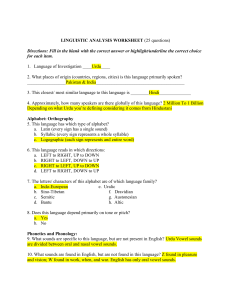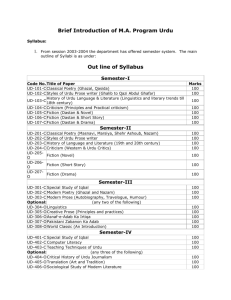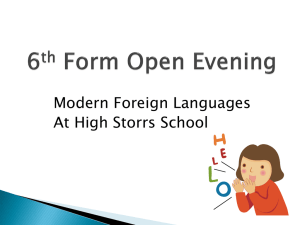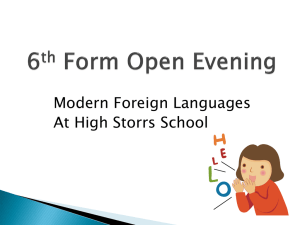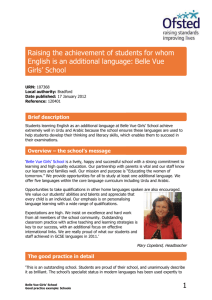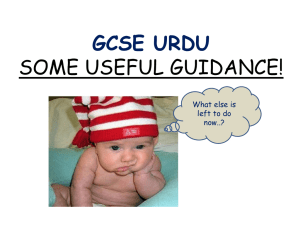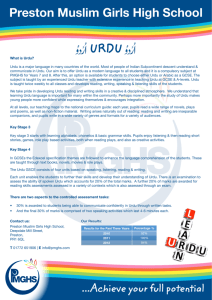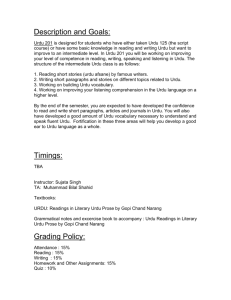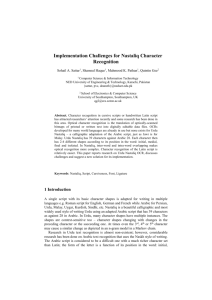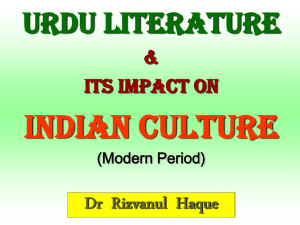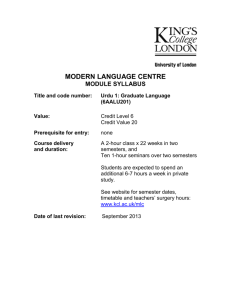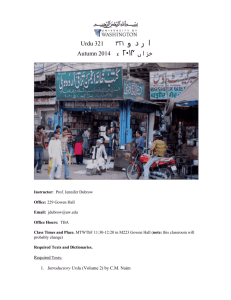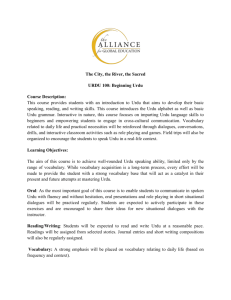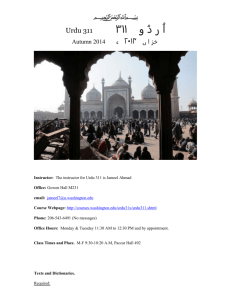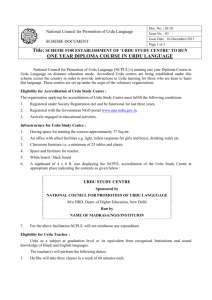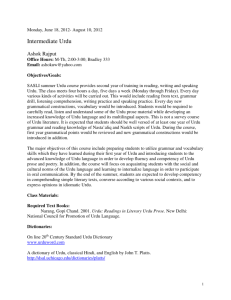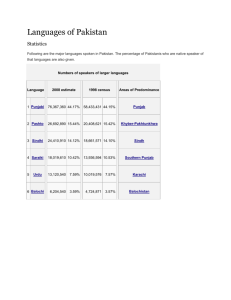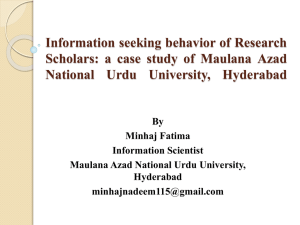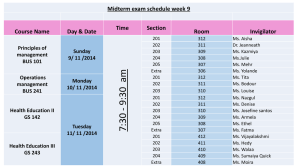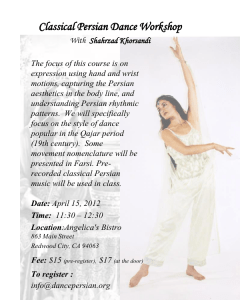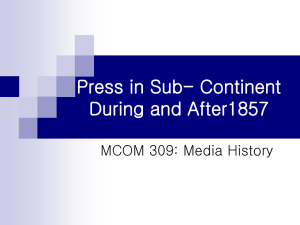it`s raining scripts (Teaching right-to
advertisement
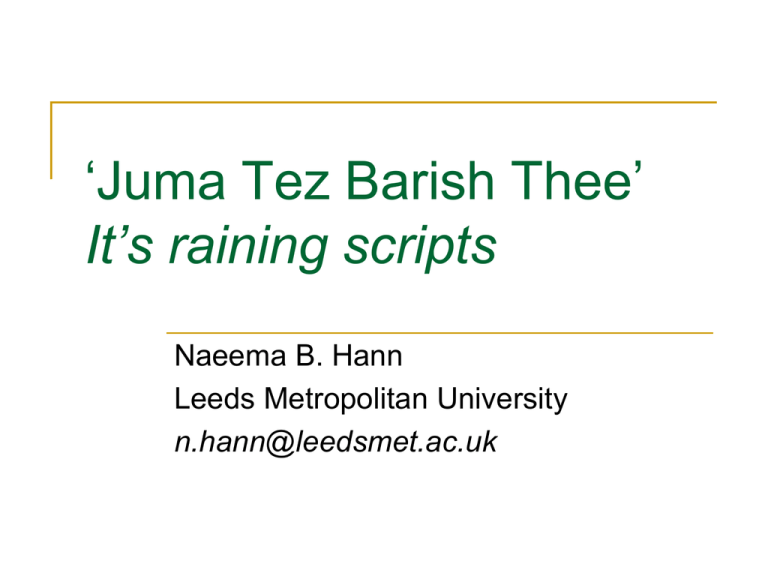
‘Juma Tez Barish Thee’ It’s raining scripts Naeema B. Hann Leeds Metropolitan University n.hann@leedsmet.ac.uk This session Overview of right to left script features Creating experiences to convince students of the value of learning the script Gap between materials and students’ needs Encouraging students to write more and more often Your comments and questions Languages with Right To left Scripts : an overview World statistics Arabic – 280 million native speakers Arabic – fifth most spoken language in the world 60 – 70 million native speakers of Persian 104 million speakers - 60 to70 million native speakers of Urdu + diasporas all over the world. Urdu speakers can communicate with more people – Urdu gives access to Hindi, Punjabi Urdu-Hindi the fourth most spoken language in world, twentieth if we look at native speaker figures UK statistics Urdu most widely spoken Arabic fifth most spoken Right To left Scripts : an overview Arabic – 28 letters, Persian – 32 letters, Urdu - 36 letters and no capital letters For most of the script, only consonants are written Special signs for short vowels but these are rarely used Many letters have the same root shape and are differentiated by dots above or below the shape Cursive script – letters change shape as they join each other in a word. Shape depends on position in word but consistent otherwise. Most letters have 4 forms – independent, initial, medial, final. Written as it sounds but ‘s’ can be represented by more than one letter Key to right-to-left scripts Letter families e.g. b ب t ت th ث Non-connectors cannot join up with letters which follow Urdu ا رد و Nor can their families Enabling students to read and write right-to-left Getting students to value the script - Using authentic sources Relate to their lives eg. emails Success Explicit teaching - Letter families - Non-connecters - Establishing Script Directions - Total Physical Response - Visual reminders Acquiring Writing (Literacy) Skills: Stages Reading: Writing Initial sounds Decoding groups of sounds (words) Sentences Meaning Reproducing sounds as shapes standard shapes for each sound decodeable by others copying? Meaning Strategies for 2 sets of learners Beginners - Initial Sounds objects around the room Post beginners - brainstorm - learners name objects beginning to write single clause sentences story bag - packs of pictures, learners weave story - Jigsaw texts - differentiation? match initial sounds to letters of alphabet - story bag - packs of objects + words on card - extension - learners bring in pictures for each letter family - noticing for learners at earlier stage - match initial sounds to pictures Encouraging students to write more and more often Meaning Models of narratives Mechanics Practice with word recognition Practice with writing/ copying - cartoon strips - audio and video narratives Google transliteration http://www.google.com/trans literate/Urdu - songs Purpose e.g. sense of audience Gap between materials and students’ needs Why do adults learn Arabic, Persian, Urdu ? To communicate with family and friends Number of native speakers It’s cool Access to another culture in own neighbourhood For work Gives access to other languages Travel The gap …… What do materials offer? What learners need .. Greetings, introductions Where’s the bank/ toilet? Where are you from? ‘I am going to be late’ Around the house Religion Daily routine Politics Weather Swear words Persuasive language/ romance …… Eating out Safe topics ….. From song to script mera Joota hai Japapni ……. to script After listening to and singing the song Beginners: - Jigsaw text with options for substitution and transformation - Sing each others’ songs as a group A2, A2+ - Transform song to change items of clothing, nationality etc. - Sing each others’ songs as a group Acknowledgements My and my students’ deepest gratitude goes to Hitomi Masuhara and Professor Brian Tomlinson, the gurus of materials development. Some Resources The 100 Word Exercise Book. G-and-W publishing, 47 High Street, Chinnor, Oxfordshire OX9 4DJ. www.g-and-w.co.uk Mixed-ability Teaching in Language Learning, includes photocopiable materials. Susan Ainslie and Susan Purcell. CILT publications. www.cilt.org.uk Elementary Communication Games. Jill and Charles Hadfield. Forest Books. Used versions available on internet, just google Jill Hadfield. For resources specific to Urdu, Arabic or Persian, please email n.hann@leedsmet.ac.uk Bibliography Alawiye, I. 2001. Gateway to Arabic: A Foundation Course in Reading and Writing Arabic. Middlesex, Anglo-Arabic Graphics Ltd. Hashmi, M. 1986. Urdu Kaisay Parhai Jaey ? (How to teach Urdu?). Bradford. Directorate of Educational Services. Hedge, T. 2009. Writing. Teaching and Learning in the Language Classroom. OUP pp.299 - 322 McPake, J., I. Sachdev; T.Carroll, T. Birks and A. Mukadam. 2008.Community Languages in Higher Education: Towards Realising the Potential. Routes into languages and HEFCE. Masuhara, H. 2007. Materials for Developing Reading skills. Ed. B. Tomlinson. Developing Materials For Language Teaching. Continuum pp.107-129. Nabi,R. ,A. Rodgers, B.Street. 2009. Hidden Literacies. Bury St.Edmonds.Uppingham Press. Nation, P. 2007. Materials for Teaching Vocabulary. Ed. B. Tomlinson. Developing Materials For Language Teaching. Continuum pp.107-129. Mirdeghan, Mahenaz. 2010. Persian, Urdu and Pashto: A comparative orthographic analysis. Writing Systems Research 2 (1) 9 – 24. Sassoon, R. 1995. The acquisition of a second writing system. Oxford. Intellect. Tomlinson, B. 2007. Developing Principled Frameworks for Materials Development . Ed. B. Tomlinson. Developing Materials For Language Teaching. Continuum pp.107-129. Wightwick, J. and Gaafar, M. (1990) Mastering Arabic. London, MacMillan.
